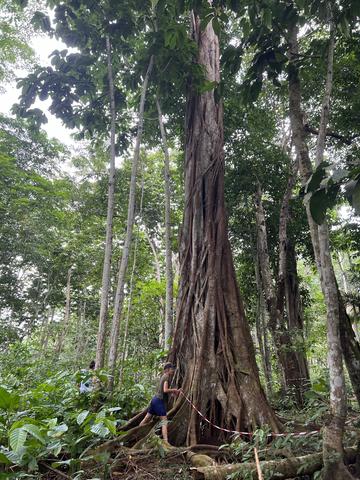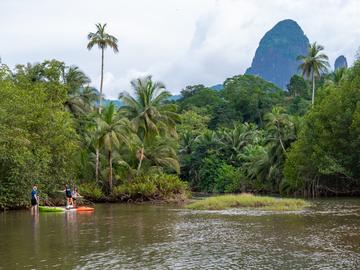Whilst on a field trip to islands off the coast of Africa, DPhil candidate Denise Swanborn writes a report of the cross-collaborative investigations they are conducting on environmental history and the significance of human-environmental interactions on island biogeography. Read her account of the trip and how they are trying to uncover the unique influence humans have had on this island nation and its biology below.
We are currently on a four-person University of Oxford expedition to the island of Príncipe, part of the island state of São Tomé and Príncipe, off the coast of equatorial West Africa. The team includes myself, Denise Swanborn (DPhil student, Department of Biology and NERC DTP), Carla V. Fuenteslópez (DPhil student, Engineering Science), Bastiaan van Dalen (PhD in Environmental Archaeology, University of Exeter) and Sophie Carlarne (Media Production Support Officer, University of Oxford). Our goal is to understand the island's environmental history and contemporary human-environment interactions on the island.

São Tomé and Príncipe have never been connected to mainland Africa. Their relative isolation has allowed the evolution of endemic species that are found nowhere else on earth, much like on the famous Galapagos islands that became the basis of Darwin’s Theory of Evolution. Despite their rich and unique biodiversity, São Tomé and Príncipe remain relatively understudied, especially the smaller island of Príncipe. São Tomé and Príncipe is an interesting case study as the islands are thought to have been uninhabited until relatively recently; human settlement likely only started in the late 15th century when the islands were discovered by the Portuguese.
Humanity’s arrival on previously uninhabited islands can significantly change ecosystems. While much of the vegetation and agricultural crops grown extensively on Príncipe were brought from other parts of the world, there’s no quantitative information on what vegetation was found on the island before its human colonisation – so we don’t know how human-mediated species introductions have changed these earlier ecosystems. By reconstructing ecosystems of the past as part of this field trip, we aim to discover how human colonisation and settlement influenced biodiversity throughout time and provide lessons relevant for contemporary environmental management.

To answer these questions, we’ve been collecting sediment cores from open water bodies on Príncipe, visiting seven different coastal lagoons and swamps around the island. Standing on a raft to avoid disturbing the ground, we lower a sediment corer to extract sediment samples for analysis back in Oxford. One of the things we will be checking for is pollen, which can tell us about the plant species that were present at different points in time. Combined with botanical surveys, we can build a timeline of changes in vegetation and potentially link these to human activity. Príncipe is a rocky volcanic island, so we weren’t sure if we would find good sediment basins. Thankfully our samples have been very promising!
We’ve also made some interesting archaeological findings such as ceramics and building materials; this wasn’t a part of our original research aims but has the potential to guide future research into patterns of human settlement and links to the natural environment. No archaeological research has been done on the islands yet, so following up on that could be quite exciting.
As well as documenting the unique biodiversity of Príncipe, we are interviewing local people to better understand the value of the natural environment to the people of Príncipe, as well as oral histories and views on sustainable development. These interviews will be the heart of a short documentary to help tell the story of Príncipe’s human-nature connections, which will be submitted to national and international film festivals.
We are very grateful for a range of partners and collaborators supporting our expedition including the University of Oxford, The Explorers Club Rolex Grant, and the Harvard Travellers Club. In the field we have received in kind support from the Belo Monte Hotel and Forever Príncipe for logistics, accommodation, and the use of a laboratory space as part of their ongoing research support activities.
Keep up to date with the Oxford Príncipe Project on Twitter, Instagram, and LinkedIn.